Building Justice

As you probably know by now, my friend Greta Christina was diagnosed with cancer last week, and she’s having surgery today. In the grand scheme of things, it could have been much worse: she has health insurance, it was caught early, and there’s an excellent chance that the operation will be a complete cure.
Still, I admit I felt some purely selfish disappointment when I first heard the news. I’d been looking forward to seeing her at Skepticon next month, which won’t be happening now. And besides, this was bad news upon bad news, coming as it did almost immediately after her father’s death. When misfortune piles up like this on someone you care about, the natural (albeit irrational) response is to get angry at the injustice of it all. I almost feel like shouting, “It’s not fair!” – except, of course, that there’s no one to shout at. The universe is governed by random chance and coincidence; there’s no capricious fate-keeper dispensing good and bad luck, no higher tribunal to which we can appeal.
We human beings evolved in a landscape where the evolutionary penalty of under-attribution was worse than the penalty for over-attribution, which explains why we so often see malicious intent lurking behind random chance. We conceive of impersonal nature as an agent, which means we often get angry when someone we care about suffers misfortune, even when there’s absolutely no target for that anger. Sometimes this leads to patently irrational displacement behavior, as in this ludicrous case where six Italian geologists were convicted of manslaughter for failing to predict an earthquake. As the link says so well, this is “a classic example of seeking someone to blame because of the emotional demands of such a vast tragedy, rather than because there is a rational reason”.
It makes no sense to shout at the void, to rage at the impersonal laws of the cosmos. As an atheist, I know this to be true. But as a humanist, I know that there are useful things we can do. When Greta asked for help to cover her living expenses while she recuperates, the secular community came through in spades, blowing past her fundraising goal in barely 24 hours. And then, of course, there’s the scientific and medical research that makes cancer treatment possible in the first place.
This, to me, is what it means to be a humanist and a progressive: the recognition that the world is an unfair place, and the desire to see it become more fair. When blind and aimless nature creates a jagged and treacherous landscape of peaks and hollows, we can come in, fill in the potholes, build bridges over the chasms, and extend ladders down to people who are stuck in deep holes through no fault of their own.
Or a better metaphor might be that establishing justice is like building a tower. Each generation adds on a few more stories, making the whole structure higher than it was, enabling us to see to farther horizons from the top. Some of us may be able to do more than others, but everyone can contribute to the overall project, even if it’s just by laying a single brick.
Either way, the important point to take away is that justice isn’t a one-time accomplishment that we set up and then walk away from. It is and must be an ongoing effort to remedy the world’s unfairness in whatever ways we can. And the opposite is true as well: if we don’t work for justice, if we don’t put in the effort to shore up its foundations and defend it, we can expect to lose it. What have you done recently to make the world a fairer place?
Image credit: David Weekly, released under CC BY 2.0 license
Daylight Atheism: The Book is now available! Click here for reviews and ordering information.





